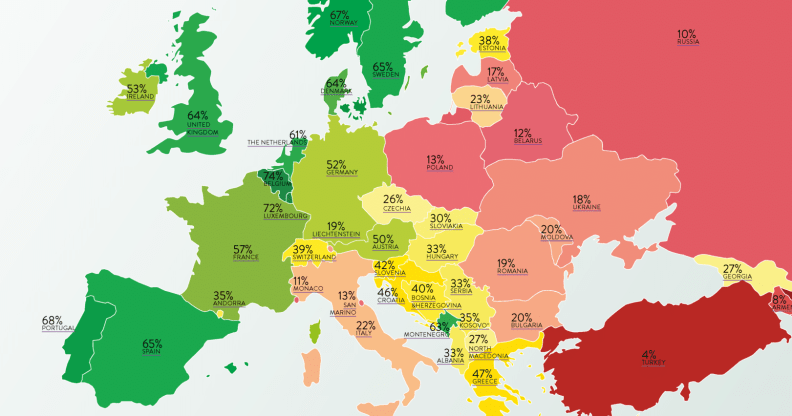UK slides even further down rankings of most LGBT-friendly nations in Europe

ILGA Europe’s Rainbow Map is released each year on IDAHOBIT, to track the progress of LGBT+ rights across the continent. (ILGA Europe)
LGBT+ rights in Europe have reached a concerning “standstill” and the UK continues to slowly decline, according to the annual Rainbow Map rankings.
This year’s Rainbow Map revealed a “widespread and almost complete stagnation” on LGBT+ rights across Europe, reporting “almost no positive legislative change” since last year.
The Rainbow Map has been published by LGBT+ organisation ILGA-Europe every year on 17 May for the International Day Against Homophobia, Biphobia and Transphobia (IDAHOBIT) since 2009.
It gives 49 European nations a percentage ranking based on 71 criteria broken down into six key areas, including equality and non-discrimination, hate crime and hate speech, and legal gender recognition and bodily integrity.
Two additional criteria were added for this year: non-binary recognition and legal gender recognition procedures for minors, both included in the gender recognition and bodily integrity category.
The UK was once the highest-ranked nation in Europe for LGBT+ rights. Now, it’s not even close
This year, Malta topped the rankings for the sixth year running with 94 per cent, ahead of Belgium in second place by almost 20 per cent. Malta, Belgium and Luxembourg have now occupied the same top three spots for the third year running. Scandinavia also did well, with Norway, Sweden and Denmark all placing in the top 10.
The countries at the bottom of the ranking are also the same as in 2020: Azerbaijan, Turkey and Armenia, scoring just two, four and seven per cent respectively. Poland has also continued to be the lowest ranking EU member for the second year.
The UK fell further down the rankings, coming in tenth place with 64 per cent, compared to last year when it ranked ninth with 66 per cent, and eighth the year before. Until 2015, the UK was rated the top place in Europe for LGBT+ rights in the ranking.
ILGA cited growing anti-trans rhetoric, delays to banning conversion therapy and criticism of LGBT+ curriculums in schools as reasons for the UK’s decreasing score, in their annual review. However, it also praised the Scottish government’s Hate Crime and Public Order Bill, an employment tribunal ruling to protect non-binary people from discrimination and Northern Ireland winning full marriage equality.
ILGA-Europe: ‘Governments have to follow through on their promises’
ILGA-Europe’s executive director Evelyne Paradis called the results “deeply worrying”. She identified “growing political polarisation” as a key problem in many countries, speaking to Reuters and said: “Governments have to follow through on their promises.”
She commented: “There’s been a clear political backlash in many countries, and not just ones grabbing headlines like Poland and Hungary.
“In the past year, we’ve seen increased political repression against LGBTI people, a stark rise in socio-economic hardship, and the spreading of LGBTI-phobic hatred on the streets and online across the region.
“Against this backdrop, the response from governments has to be more and better concrete action, to make sure people are more protected, not less.
“The human rights of LGBTI people simply cannot be something that you drop when circumstances are challenging.”

